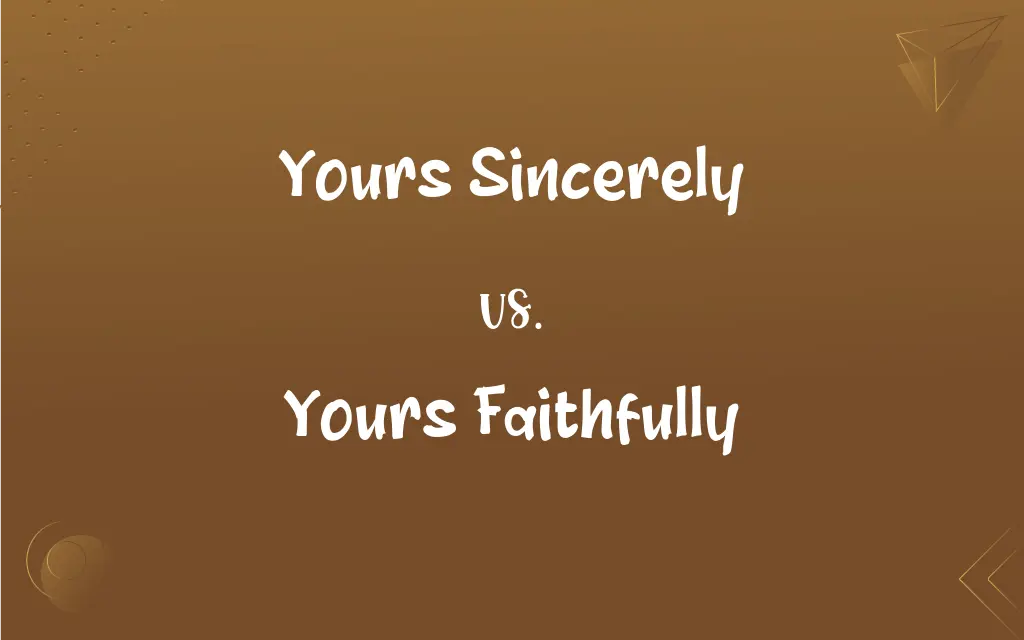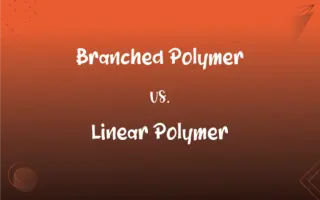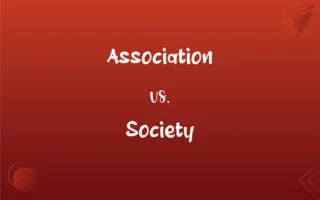Yours Sincerely vs. Yours Faithfully: What's the Difference?
Edited by Aimie Carlson || By Janet White || Updated on November 22, 2023
"Yours Sincerely" is used when the recipient is known; "Yours Faithfully" when unknown. Both express politeness and formality in closing a letter.

Key Differences
"Yours Sincerely" is traditionally used in correspondence where the writer knows the recipient or their name. It's a formal, polite way to conclude communications, demonstrating a certain level of familiarity and respect. Conversely, "Yours Faithfully" is employed when the recipient is unknown, reflecting respect while acknowledging the lack of personal acquaintance.
"Yours Sincerely" is often seen as a sign of professionalism and formality in business communications, suitable for instances where there is some degree of prior interaction or knowledge of the recipient. "Yours Faithfully," while also formal, is more indicative of the writer's loyalty or duty to the recipient, even without prior interactions, making it appropriate for communications like job applications or inquiries to unknown parties.
"Yours Sincerely" conveys a sense of sincerity in the writer's tone, implying honesty and genuineness in the preceding message, suitable for situations where a rapport has been established. On the other hand, "Yours Faithfully" tends to imply dedication and steadfastness, suggesting the writer's faithful respect toward the recipient, irrespective of a personal connection.
"Yours Sincerely" is commonly used in American English, where closing salutations in formal letters often require an acknowledgment of the relationship between the parties. In contrast, "Yours Faithfully" is more common in British English, used when the recipient's identity is unknown, maintaining a respectful formality in communication.
Both "Yours Sincerely" and "Yours Faithfully" have their roots in formal correspondence, and choosing between them depends on the writer's relationship with the recipient. "Yours Sincerely" closes letters where there's familiarity, while "Yours Faithfully" is reserved for situations where the recipient's identity is anonymous or unknown.
ADVERTISEMENT
Comparison Chart
Usage Context
Known recipient
Unknown recipient
Implied Meaning
Sincerity, honesty
Loyalty, respect
Common in
Business, professional relationships
Job applications, inquiries
Reflects
Familiarity, rapport
Formality without personal acquaintance
Preferred in
American English
British English
ADVERTISEMENT
Yours Sincerely and Yours Faithfully Definitions
Yours Sincerely
"Yours Sincerely" is used when the recipient's name or identity is known;
Thank you for considering my application, Yours Sincerely, [Your Name].
Yours Faithfully
"Yours Faithfully" is appropriate for non-personal interactions;
I would appreciate a prompt response to my inquiry, Yours Faithfully, [Your Name].
Yours Sincerely
"Yours Sincerely" implies honesty and genuineness;
I assure you of my full cooperation, Yours Sincerely, [Your Name].
Yours Faithfully
"Yours Faithfully" suggests loyalty and steadfastness;
I remain committed to upholding the standards of your institution, Yours Faithfully, [Your Name].
Yours Sincerely
"Yours Sincerely" is a polite sign-off in formal correspondence;
I look forward to your response, Yours Sincerely, [Your Name].
Yours Faithfully
"Yours Faithfully" is a traditional way to end a letter when the recipient's identity is unknown;
I trust this matter will be resolved promptly, Yours Faithfully, [Your Name].
Yours Sincerely
"Yours Sincerely" is a standard closure in business communications;
Please do not hesitate to contact me for further information, Yours Sincerely, [Your Name].
Yours Faithfully
"Yours Faithfully" is used when writing to someone whose name you don't know;
I am available for an interview at your earliest convenience, Yours Faithfully, [Your Name].
Yours Sincerely
"Yours Sincerely" marks the ending of professional or formal letters;
I appreciate your guidance on this matter, Yours Sincerely, [Your Name].
Yours Faithfully
"Yours Faithfully" shows respect in formal communication;
Thank you for taking the time to read my letter, Yours Faithfully, [Your Name].
FAQs
Is "Yours Faithfully" outdated?
It's traditional but still in use, especially in formal contexts or British English.
Can I use "Yours Sincerely" and "Yours Faithfully" interchangeably?
No, "Yours Sincerely" is used when the recipient's name is known, and "Yours Faithfully" when it's unknown.
Can "Yours Faithfully" be used in all formal letters?
Generally, it's used only when the recipient's name is unknown.
When should I use "Yours Faithfully"?
When you don't know the recipient's name or when you haven't addressed them by name.
Why "Yours Sincerely" in job applications?
When the hiring manager's name is known, it adds a personal touch.
Is "Yours Faithfully" too impersonal?
It's formal and shows respect, appropriate when the recipient's name is unknown.
Is "Yours Sincerely" too formal?
It's appropriate for professional or formal correspondence, not casual communication.
Can "Yours Sincerely" be used for emails?
Yes, it's suitable for formal or professional emails.
Does "Yours Faithfully" suggest devotion?
It implies respect and formality rather than personal devotion.
What can replace "Yours Sincerely"?
"Best regards," "Kind regards," or "Respectfully" can be alternatives.
Can I start a letter with "Yours Sincerely"?
No, it's used as a closing salutation.
Does "Yours Sincerely" imply honesty?
It conveys sincerity and politeness, not necessarily honesty.
Is "Yours Sincerely" only for letters?
It's common in letters but also appropriate for professional emails.
Is "Yours Faithfully" suitable for all unknown recipients?
It's suitable for recipients not addressed by name in formal contexts.
What's the tone of "Yours Sincerely"?
Professional, polite, and somewhat formal.
What's the impact of "Yours Sincerely" in communication?
It conveys respect and professionalism, ending the correspondence on a formal note.
Is there a difference in meaning between "Yours Sincerely" and "Yours Truly"?
"Yours Truly" is less formal and can be used in a wider range of contexts.
Can "Yours Faithfully" be used in friendly letters?
It's generally too formal for friendly, informal correspondence.
What does "Yours Faithfully" convey?
It shows respect and formality when the recipient's name is unknown.
Is "Yours Faithfully" common in the US?
It's more common in British English but understood in American English.
About Author
Written by
Janet WhiteJanet White has been an esteemed writer and blogger for Difference Wiki. Holding a Master's degree in Science and Medical Journalism from the prestigious Boston University, she has consistently demonstrated her expertise and passion for her field. When she's not immersed in her work, Janet relishes her time exercising, delving into a good book, and cherishing moments with friends and family.
Edited by
Aimie CarlsonAimie Carlson, holding a master's degree in English literature, is a fervent English language enthusiast. She lends her writing talents to Difference Wiki, a prominent website that specializes in comparisons, offering readers insightful analyses that both captivate and inform.































































